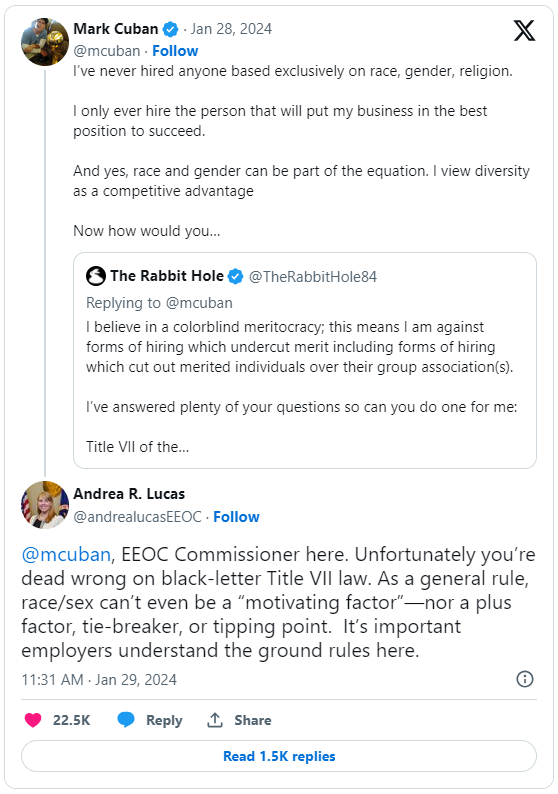Search
An EEOC Commissioner takes issue with a billionaire’s position on Diversity, Equity and Inclusion

Folks, I did not have EEOC Commissioner Andrea Lucas giving billionaire Mark Cuban a public antidiscrimination lesson on my Bingo board.
But, as I was scrolling through X on Monday, here is what I saw:

On Sunday, Mr. Cuban, of Shark Tank fame, the former principal owner of the NBA’s Dallas Mavericks, and a proponent of DEI policies, tweeted that he’s “never hired anyone based exclusively on race, gender, religion.”
However, in the same tweet, Mr. Cuban added that “race and gender can be part of the [hiring] equation. I view diversity as a competitive advantage.”
On Monday, Commissioner Lucas replied that Mr. Cuban was “dead wrong on black-letter Title VII law.” Title VII of the Civil Rights Act of 1964 makes it illegal to discriminate against someone based on race and sex, among other protected characteristics.
“As a general rule, race/sex can’t even be a ‘motivating factor’—nor a plus factor, tie-breaker, or tipping point. It’s important employers understand the ground rules here,” she added before separately tweeting a link to an article she wrote for Reuters on the relevant legal standards and corresponding potential risks applying to corporate diversity programs.
In that article, Commissioner Lucas emphasizes that the “[Supreme] Court never has blessed employers taking race-conscious employment actions based on interests in workforce diversity” and has only “authorized employers to consider race (and sex) only in very limited circumstances as part of voluntary, remedial affirmative action plans.”
In an interview yesterday with Fox Business, Commissioner Lucas reaffirmed that if race or sex is “any part of the [hiring] decision, then it’s a motivating factor. And that’s illegal.”
Earlier, Mr. Cuban tweeted a link to a YouTube video of an October 2023 event The Federalist Society hosted featuring Commissioner Lucas and EEOC Vice Chair Jocelyn Samuel, in which they discussed the benefits and risks related to various categories of DEI programs, how employers should assess the lawfulness of their initiatives and promising practices and guardrails for employers. Both agreed that employers cannot set quotas (e.g., we must hire “x” number of black men or promote “y” number of white women) and act on them.
In a separate statement, EEOC Chair Charlotte Burrows has stressed that federal antidiscrimination law does not prevent a business from fostering diversity, equity, and inclusion goals.
The problem for employers is that there appears to be no consensus on the precise contours of a ‘legal’ DEI policy, even among the EEOC Commissioners.
But let’s get one thing clear: policies and training on equal employment opportunity for all protected classes and anti-harassment have been around (and legal) for decades. They remain part of the backbone of a compliant workplace and an essential investment for businesses in their workplaces.
 The Employer Handbook Blog
The Employer Handbook Blog


